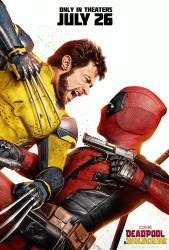Continuity mistake: When Deadpool is talking to Wolverine's skeleton, in one shot the skeleton's mouth is closed, but in the next shot it is open.

Deadpool & Wolverine (2024)
Trailers
Directed by: Shawn Levy
Starring: Ryan Reynolds, Hugh Jackman, Matthew Macfadyen
More trailers
Blind Al: Wanna do some cocaine?
Wade Wilson: Hey! Cocaine is the one thing that Feige said is off limits.
Blind Al: What about Bolivian marching powder?
Wade Wilson: They know all the slang terms. They have a list.
Blind Al: Even snowboarding?
Wade Wilson: Even disco dust.
Blind Al: White Girl, Interrupted?
Wade Wilson: Even Forrest Bump.
Blind Al: Do you want to build a snowman?
Wade Wilson: Yes! But I can't!
Trivia: Marvel Studios' president Kevin Feige initially advised Hugh Jackman not to return to the role of Wolverine, as he felt Logan was the perfect sendoff for his portrayal of the character.
Question: Deadpool knows that he is in a film, which explains why he can easily recognise everyone, including Wolverine, X-23, Johnny Storm, Blade, Ant-Man, Sabretooth, Juggernaut, and even the actors playing them. So why didn't he recognise Elektra? Jennifer Garner's popularity alone should have made it easy for him.
Join the mailing list
Separate from membership, this is to get updates about mistakes in recent releases. Addresses are not passed on to any third party, and are used solely for direct communication from this site. You can unsubscribe at any time.
Check out the mistake & trivia books, on Kindle and in paperback.




Answer: Part of the novelty of knowing that he's in a film means servicing the plot, especially as a proxy for those audience members who may not be as familiar with some characters. Deadpool also does seem to know who Elektra is, as he apologises to her upon hearing about Daredevil's death, even though he just met her moments earlier.
Phaneron ★